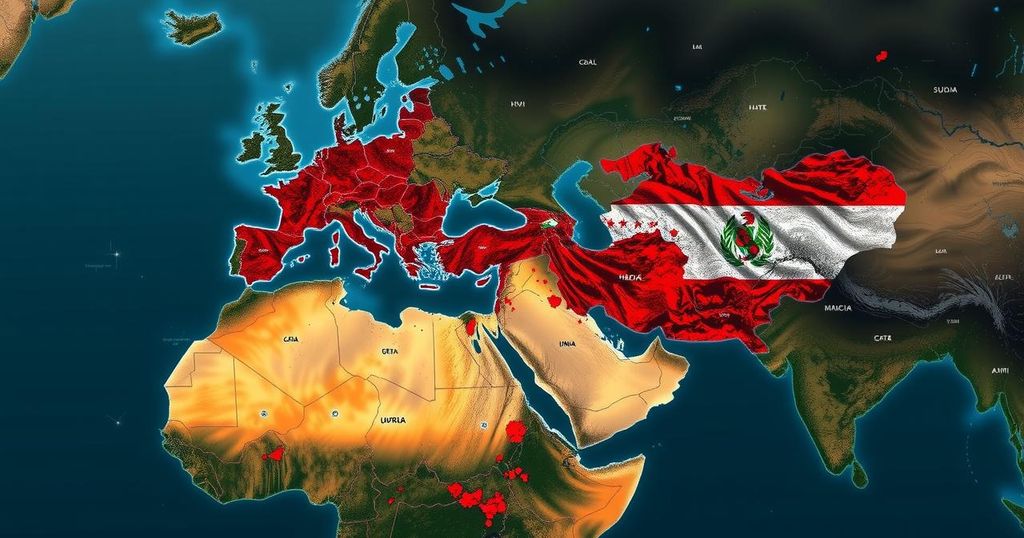Today’s key news highlights a range of humanitarian crises. In Sudan, the UN stresses urgent aid needs amidst conflict. Gaza faces flooding issues impacting displaced families, while Lebanon experiences escalating violence, particularly affecting children. Haiti reports a surge in gender-based violence. Ukraine continues to face attacks causing significant infrastructure damage. In Syria, ongoing violence has disrupted healthcare amid a critical funding shortfall.
Today’s global headlines focus on urgent humanitarian crises across various regions, including Sudan, the Occupied Palestinian Territory, Lebanon, Haiti, Ukraine, and Syria. In Sudan, Under-Secretary-General for Humanitarian Affairs Tom Fletcher emphasized the dire conditions requiring global attention. His visit coincides with escalating violence, prompting discussions on the delivery of aid to affected areas, particularly in the east where displacement remains critical. Meanwhile, the World Food Programme commenced operations in northern Sudan to expedite humanitarian aid access.
In the Occupied Palestinian Territory, heavy rains led to flooding in areas housing displaced families in Khan Younis and Gaza City, with significant damage reported. The United Nations Office for the Coordination of Humanitarian Affairs (OCHA) continues to assess the situation, revealing substantial vulnerabilities such as the lack of contingency plans for further flooding. In North Gaza, the ongoing conflict resulted in injuries at a hospital due to recent attacks, leading the World Health Organization’s Director-General to denounce the violence and call for safety in healthcare delivery.
Lebanon’s humanitarian crisis has intensified, with OCHA declaring the situation one of the deadliest in decades. Following a recent airstrike, significant casualties occurred, adding to the alarming weekly death toll. UNICEF reported that school closures due to violence have further disrupted educational access for children amidst the ongoing crisis.
In Haiti, gender-based violence remains a pressing concern, particularly exacerbated by the socio-economic crisis. Reports indicate a significant increase in incidents of violence against women and girls. The United Nations Population Fund highlighted severe funding shortages for critical services intended to support survivors of such violence.
Reports from Ukraine indicate continued attacks resulting in numerous casualties and substantial damage to infrastructure as winter approaches. Humanitarian organizations have mobilized assistance in the affected regions to help families cope with the cold conditions.
Finally, in Syria, ongoing attacks in the northwest have led to civilian deaths and interrupted healthcare services as funding for humanitarian efforts remains critically low. The Humanitarian Response Plan for Syria is substantially underfunded, leaving millions of the most vulnerable individuals without essential aid.
The global humanitarian landscape is fraught with crises that require urgent international attention and cooperation. Current events in various regions highlight the escalating violence and disruption of basic services, which disproportionately affect vulnerable populations, specifically women and children. Each region examined has distinct challenges but shares common themes of displacement, violence, and an urgent need for humanitarian support. As the world observes these humanitarian needs, responses from global organizations become critical in alleviating the suffering of millions affected.
The current humanitarian crises across Sudan, the Occupied Palestinian Territory, Lebanon, Haiti, Ukraine, and Syria underscore the need for immediate global action and support. With various territories facing unprecedented violence and overwhelming challenges in delivering aid, international cooperation is vital to addressing these urgent humanitarian needs. The alarming statistics reveal a pressing persistence of issues such as gender-based violence, infrastructural collapse, and extreme humanitarian gaps in service provision.
Original Source: www.unocha.org







